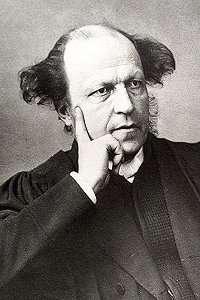Edwin Hatch
Edwin Hatch (September 4, 1835 Derby, England – November 10, 1889 Oxford, England) was an English theologian. He is best known as the author of the book Influence of Greek Ideas and Usages Upon the Christian Church, which was based on the lectures he presented during the 1888 Hibbert Lectures and which were edited and published following his death. He is also remembered as the composer of the hymn "Breathe on Me, Breath of God."
Edwin Hatch | |
|---|---|
 | |
| Born | September 4, 1835 Derby, England |
| Died | November 10, 1889 (aged 54) Oxford, England |
| Nationality | English |
| Alma mater | King Edward's School, Birmingham Pembroke College Oxford University |
| Occupation | Professor, author |
| Children | 4, including Beatrice, Evelyn and Ethel Hatch |
Biography
Hatch attended King Edward's School, Birmingham, where he studied under James Prince Lee, who later became the Bishop of Manchester; it was during this period of his life that he was first noted for his strong mental independence and extreme study habits, as well as when he joined the Church of England (having been raised a nonconformist). He graduated from Pembroke College at Oxford University in 1857, where he was a dominant figure in the Birmingham Set,[1] after undergraduate studies at Cambridge University. In 1858, Hatch won the Ellerton prize. In 1859, he was ordained as an Anglican priest, and travelled to Toronto, Canada West, where he was professor of classics at Trinity College until 1862. Between then and his return to Oxford, England in 1867, he served as rector of the High School of Quebec and professor of Classics at Morrin College, both in Quebec City. He served as vice-principal of Saint Mary Hall until 1885. In 1884 he was appointed university reader in ecclesiastical history.
In 1873, Hatch edited The student's handbook to the University and colleges of Oxford, which appeared in several revised editions during and after his time at the University. Hatch was a Bampton lecturer in 1880. He served as a Grinfield lecturer from 1880 to 1884, during which time he presented his concordance on the Septuagint. Author of hymn Breathe on me, Breath of God. 1878.(The Book of Common Prayer)
Family
Hatch and his wife Evelyn had four children: Arthur Herbert Hatch (b. 1864), Beatrice Hatch (b. 1866), Ethel Hatch (b. 1869), and Evelyn Hatch (b. 1871).
Written works
- The organization of the early Christian churches (1881) – the Bampton lectures of 1880; translated into German by Adolf von Harnack (Giessen, 1883)

- The Growth of Church Institutions (1887)
- Essays in Biblical Greek (1889)
- A Concordance to the Septuagint and the Other Greek Versions of the Old Testament (including the Apocryphal books) by Edwin Hatch and Henry A. Redpath, assisted by many scholars (Oxford: Clarendon Press, 1897)
- Towards Fields of Light (1889) – sacred poems
- The God of Hope (1890)
- The influence of Greek ideas and usages upon the Christian church (the “Hibbert Lectures,” edited by Andrew Martin Fairbairn, 1897)
Notes
- Hare, Humphrey (1949), Swinburne: a biographical approach, London: H. F. & G. Witherby, p. 38, OCLC 361619, retrieved 2011-06-04
References
- Chisholm, Hugh, ed. (1911). . Encyclopædia Britannica (11th ed.). Cambridge University Press.
- Memorials of Edwin Hatch: sometime reader in ecclesiastical history in the University of Oxford, and rector of Purleigh, edited by his brother (Samuel C. Hatch). London : Hodder and Stoughton, 1890.
- Aspects of Edwin Hatch, by Peter Colin Carlsson. Thesis (M.Phil.) - University of Southampton, Dept. of Theology, 1974.
- Gilman, D. C.; Peck, H. T.; Colby, F. M., eds. (1905). . New International Encyclopedia (1st ed.). New York: Dodd, Mead. This work in turn cites an article by Harnack in the Theologische Litteratur Zeitung (1890)